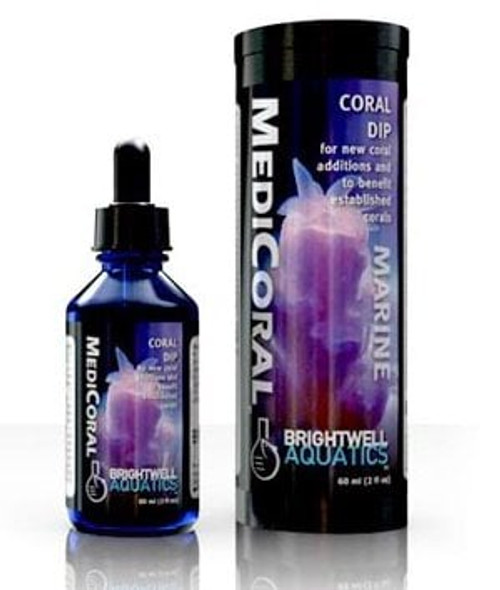Brightwell Aquatics MediCoral Coral Dip, 60 ml. / 2 oz.
* Safe for all varieties of corals and their allies, including colonial and solitary polyps.
* Triple-acting formulation provides short- and long-term benefits to dipped corals.
* Formulated to prepare corals for addition to a pre-existing aquarium, as well as to benefit corals showing signs of tissue damage or degradation.
* Gently oxidizes areas of damaged coral tissue to help halt, or prevent onset of, tissue degradation.
* Discourages pathogens from establishing themselves in areas of damaged tissue.
* Not a medication; contains no antibiotics or heavy metals.
* Over 50% stronger than competing products.
* Formulated by a marine scientist.
Technical Overview:
Experienced hobbyists are well aware of the delicate nature of the soft tissue that constitutes the living coral polyp, particularly in the case of stony corals. Inspection of a bare stony coral skeleton often reveals a very convoluted and sharp structure; when coral tissue is inadvertently pressed against such a structure, the resulting local tissue damage can create an entry way for infection and/or infestation by organisms that would otherwise be combated by the coral’s immune system. Physical damage to coral tissue is not an uncommon event during shipping and/or handling, and is an unavoidable result of fragmenting when the cutting site is not bare skeleton (again, in the case of a stony coral; cutting soft corals and polyps will always result in tissue damage). A colony or individual may also experience stress as a matter of changing chemical or physical conditions in the aquarium, often leading to weakening of the immune system, with the afore-mentioned infection/infestation as a possible result.
Instructions and Guidelines:
To prepare solution, add 1.0 ml (~20 drops) of MediCoral per 1 US-gallon (3.785 L) of seasoned aquarium saltwater in a clean plastic or glass container, then immerse coral completely as follows: Small-polyp Stony Corals: 7 - 10 minutes; Large-polyp Stony Corals: 6 - 9 minutes; Soft (“Leather”) Corals: 8 - 11 minutes; Colonial and Solitary Polyps: 5 - 8 minutes. Discard solution when finished, then rinse coral in clean aquarium water and place coral into aquarium system. Process may be repeated daily as desired/required. If coral shows signs of irritation from being immersed, remove from solution; subsequently, coral may be placed into solution for less time, or strength of solution may be diluted. Solution may be increased in strength if hobbyist feels that there is reason to do so; do not exceed 150% recommended strength of solution (e.g. 30 drops per 1 US-gallon of water). It is suggested that new coral acquisitions be temporarily located in such a manner that the tissue around their base (where the soft tissue gives way to the bare skeleton) may be visually inspected for the first 1 - 2 weeks of ownership; doing so will enable the tissue to be monitored for signs of degradation and/or undesirable organisms (e.g. “stowaways”) that may have escaped detection during initial inspection. Failing to inspect new coral additions for signs of tissue degradation and/or infection as they arrive from outside sources can have a disastrous impact on an entire reef system.
Caution: Keep out of reach of children. Not for human consumption. Contact poison control center if ingested.
Ingredients:
Purified water, proprietary iodine compounds.
Item No. AD-BA-MDC60













